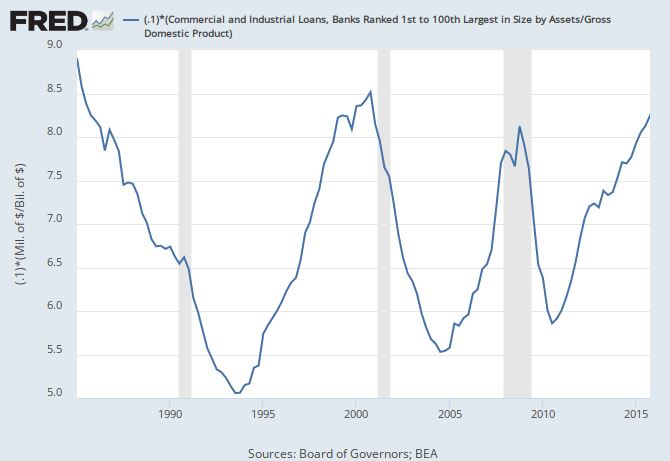
The Fed actually did something right during the Great Recession. It created the Commercial Paper Funding Facility. The CPFF contributed to liquidity in the commercial paper markets. The facility was closed in 2010.
Commercial paper funded real estate loans, and with the stricter guidelines implemented after the real estate crash, commercial paper actually has slowed down significantly as a means of funding consumer debt.
So, as a result, household debt has been drastically reduced:
As Stephen Williamson, St Louis Fed VP, has pointed out, the decrease in consumer debt has been mainly mortgage debt reduction. Fewer people qualify for loans but C & I Loans do continue. Yet, as the chart below shows, banks continue to lend robustly to somebody, but not necessarily to the American consumer:
It has been said that this lending has partly been in ABS lending, auto loans, as opposed to MBS lending, mortgage loans. This would explain that direct lending. And also, the banks are taking up some slack in Europe. This lending is not creating inflation in the USA, as the consumer is languishing.
So, there are healthy and unhealthy aspects to this slowdown in lending. Consumers are able to strengthen their balance sheets but maybe not so much, as rent has been increasing. At least the temptation to get HELOC funding is way down, as Dr Williamson points out. The expectation of house appreciation fueled that HELOC funding, as consumers believed their house prices would go up to offset the additional credit from HELOCs. Of course, when that appreciation stopped, the entire edifice was plunged into a Great Recession.
The expectation of house price increase was fostered by the bankers, and especially by chief NAR economist, David Lereah. I watched David Lereah appear on CNBC daily for quite some time during the slow motion housing crash of the past decade, stating that house prices would bounce back, that the dip was temporary.
Was he at fault for this misplaced optimism or was he abandoned by the Federal Reserve, who, although they did offer liquidity, seemed to plan the decline of commercial paper by design? Perhaps it was a mixture of both Fed design and Lereah’s misplaced optimism. Maybe we will never know for sure. Market monetarists would certainly blame the Fed for a decline in commercial paper. David Lereah did admit, according to Zero Hedge, that he lied about the housing bubble after all.



















